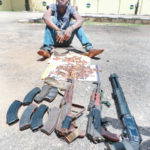
From Kano comes the next one: Mohammed Mustafa Cengiz, who, a little over two months back, scored Distinction and pushed aside every competition to emerge the best graduating student at the Kazan State Medical University in Russia.
The Kazan State Medical University (KSMU) was in 2014 rated the third best medical university in the world in the Academic Ranking of World Universities (ARES 2014). That rating involved more than 2000 universities (medical schools) around the world, including more than 100 Russian higher education institutions.
Authorities say Mustafa’s feat is a record in the institution (something akin to scoring a perfect CGPA of 5.0 in Nigerian parlance).
At the graduation ceremony, the Russian Minister of Health, Veronika Skvortsova, was reported to have presented the award to him amidst thunderous ovation.
Also Read: Folafoluwa: A name fit for a genius!
Mustafa, who is of Nigerian and Turkish parents, attributed his academic feat to hard work and God’s grace. But he said he still has his eyes on greater things than emerging best in medical school: he wants to practise as a Cardiothoracic Surgeon.
“I wouldn’t consider myself as having made a name yet, because the ultimate goal (to become a practising Cardiothoracic Surgeon) is still on the horizon,” he said.
It takes serious efforts to emerge the best in a university anywhere and in any course; it takes even extra efforts to achieve the ‘perfect score’ in Medicine.

Apart from the grace of God, hard work and determination, Mustafa said the rather unpleasant Russian climate also helped, ironically. The extreme whether compelled him to stay indoors most of the time, and he was wise enough to make the best of it.
“To be honest, the harsh Russian climate played an important role. When it’s too cold to go out, especially for those (of us) who came from the Southern Hemisphere, and one gets bored of being inside for too long, it eventually pushes you to grab a textbook or practise some procedures,” he told reporters.
So, was it all study and no play? Hardly. Mustafa said he knew how to (and he did) catch some fun too; but he still achieved his goal because he kept his eyes on the goal and stuck to his study formula.
“Like the Hausa saying goes: ‘taba kida, taba karatu’ (a little bit of fun, a little bit of play), it’s all about studying smart and not studying too much. I mean, when you know what is needed from you, you eventually connect the dots and concentrate on the relevant information.
“I was actually an indoor person during my study, mostly because of the climate, as I mentioned. So, during my free time, I usually loved to cook, catch up with family and friends back home, or play chess. When I did go out, I liked to visit historical places: museums, theatres and some architectural buildings around the city. I also love to read, not novels, mostly textbooks and current affairs,” he said.
Mustafa left Nigeria in 2009 after he finished his secondary education at the Bennie College, Kano. Obviously, like many of his type who had the privilege, the generally unstable educational system in Nigeria pushed him out. It paid off.
“I actually completed both my primary and secondary education in Kano, Rakad International (primary school) and Bennie College. I completed my West African Senior School Certificate Examination (WASSCE) before I left Nigeria in 2009.
“Afterwards, I took an academic leave for about two years and did some part-time work and courses.
“The Russian educational system is quite impressive when it comes to practical education. They implement several methods to approach learning and understanding. Unfortunately, I don’t have enough experience with the Nigerian higher education system to be able to compare; but amongst what friends and colleagues have complained of, it’s being ‘more theoretical than practical’ that has been the area of concern.”
Mustafa has his eyes set on someday returning to Nigeria to use his skill and practise as a Cardiothoracic Surgeon; but he says there are still, as it were, many rivers to cross.
“That path to becoming a well qualified Cardiothoracic Surgeon is still far. In order for me to become the specialist I need to be and be able to give Nigerians the best medical and therapeutic interventions they need, I would have to first practise in a well equipped environment.
“I am half Turkish half Nigerian, and I am currently in Turkey to start my medical residency, to ensure I have got the optimum knowledge needed.
“Don’t get me wrong. Nigeria has the potential, as quality, to gain such experience; however, the quantity is limited – meaning it would be more hectic there than here.”





